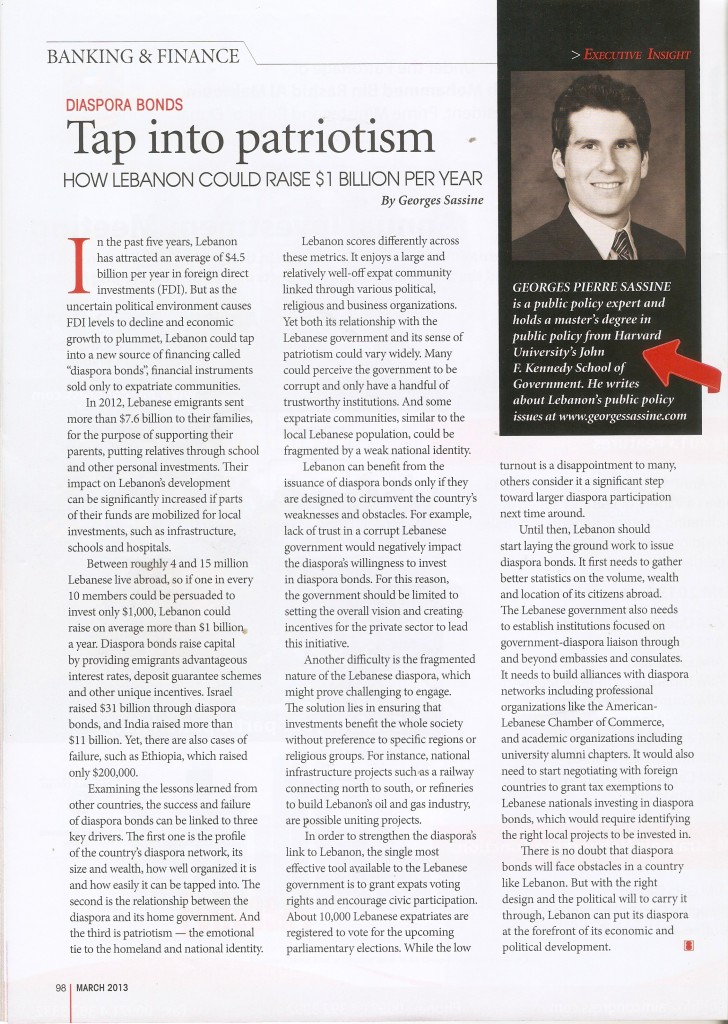By Georges Pierre Sassine on March 04, 2013
A version of this article appeared in the March 2013 print edition of Executive Magazine.
In the past five years, Lebanon has attracted an average of $4.5 billion per year in foreign direct investments (FDI). But as the uncertain political environment causes FDI levels to decline and economic growth to plummet, Lebanon could tap into a new source of financing called “diaspora bonds”, financial instruments sold only to expatriate communities.
 In 2012, Lebanese emigrants sent more than $7.6 billion to their families, for the purpose of supporting their parents, putting relatives through school and other personal investments. Their impact on Lebanon’s development can be significantly increased if parts of their funds are mobilized for local investments, such as infrastructure, schools and hospitals.
In 2012, Lebanese emigrants sent more than $7.6 billion to their families, for the purpose of supporting their parents, putting relatives through school and other personal investments. Their impact on Lebanon’s development can be significantly increased if parts of their funds are mobilized for local investments, such as infrastructure, schools and hospitals.
Between roughly 4 and 15 million Lebanese live abroad, so if one in every 10 members could be persuaded to invest only $1,000, Lebanon could raise on average more than $1 billion a year. Diaspora bonds raise capital by providing emigrants advantageous interest rates, deposit guarantee schemes and other unique incentives. Israel raised $31 billion through diaspora bonds, and India raised more than $11 billion. Yet, there are also cases of failure, such as Ethiopia, which raised only $200,000.
Examining the lessons learned from other countries, the success and failure of diaspora bonds can be linked to three key drivers. The first one is the profile of the country’s diaspora network, its size and wealth, how well organized it is and how easily it can be tapped into. The second is the relationship between the diaspora and its home government. And the third is patriotism — the emotional tie to the homeland and national identity.
Lebanon scores differently across these metrics. It enjoys a large and relatively well-off expat community linked through various political, religious and business organizations. Yet both its relationship with the Lebanese government and its sense of patriotism could vary widely. Many could perceive the government to be corrupt and only have a handful of trustworthy institutions. And some expatriate communities, similar to the local Lebanese population, could be fragmented by a weak national identity.
Lebanon can benefit from the issuance of diaspora bonds only if they are designed to circumvent the country’s weaknesses and obstacles. For example, lack of trust in a corrupt Lebanese government would negatively impact the diaspora’s willingness to invest in diaspora bonds. For this reason, the government should be limited to setting the overall vision and creating incentives for the private sector to lead this initiative.
Another difficulty is the fragmented nature of the Lebanese diaspora, which might prove challenging to engage. The solution lies in ensuring that investments benefit the whole society without preference to specific regions or religious groups. For instance, national infrastructure projects such as a railway connecting north to south, or refineries to build Lebanon’s oil and gas industry, are possible uniting projects.
In order to strengthen the diaspora’s link to Lebanon, the single most effective tool available to the Lebanese government is to grant expats voting rights and encourage civic participation. About 10,000 Lebanese expatriates are registered to vote for the upcoming parliamentary elections. While the low turnout is a disappointment to many, others consider it a significant step toward larger diaspora participation next time around.
Until then, Lebanon should start laying the ground work to issue diaspora bonds. It first needs to gather better statistics on the volume, wealth and location of its citizens abroad. The Lebanese government also needs to establish institutions focused on government-diaspora liaison through and beyond embassies and consulates. It needs to build alliances with diaspora networks including professional organizations like the American-Lebanese Chamber of Commerce, and academic organizations including university alumni chapters. It would also need to start negotiating with foreign countries to grant tax exemptions to Lebanese nationals investing in diaspora bonds, which would require identifying the right local projects to be invested in.
There is no doubt that diaspora bonds will face obstacles in a country like Lebanon. But with the right design and the political will to carry it through, Lebanon can put its diaspora at the forefront of its economic and political development.
Georges Pierre Sassine holds a master’s degree in public policy from Harvard University’s John F. Kennedy School of Government. He writes about Lebanon’s public policy issues at www.georgessassine.com
A version of this article appeared in the March 2013 print edition of Executive Magazine.
(Executive Magazine: a leading business, economics and policy magazine in Lebanon and the Middle East)

Leave a Reply